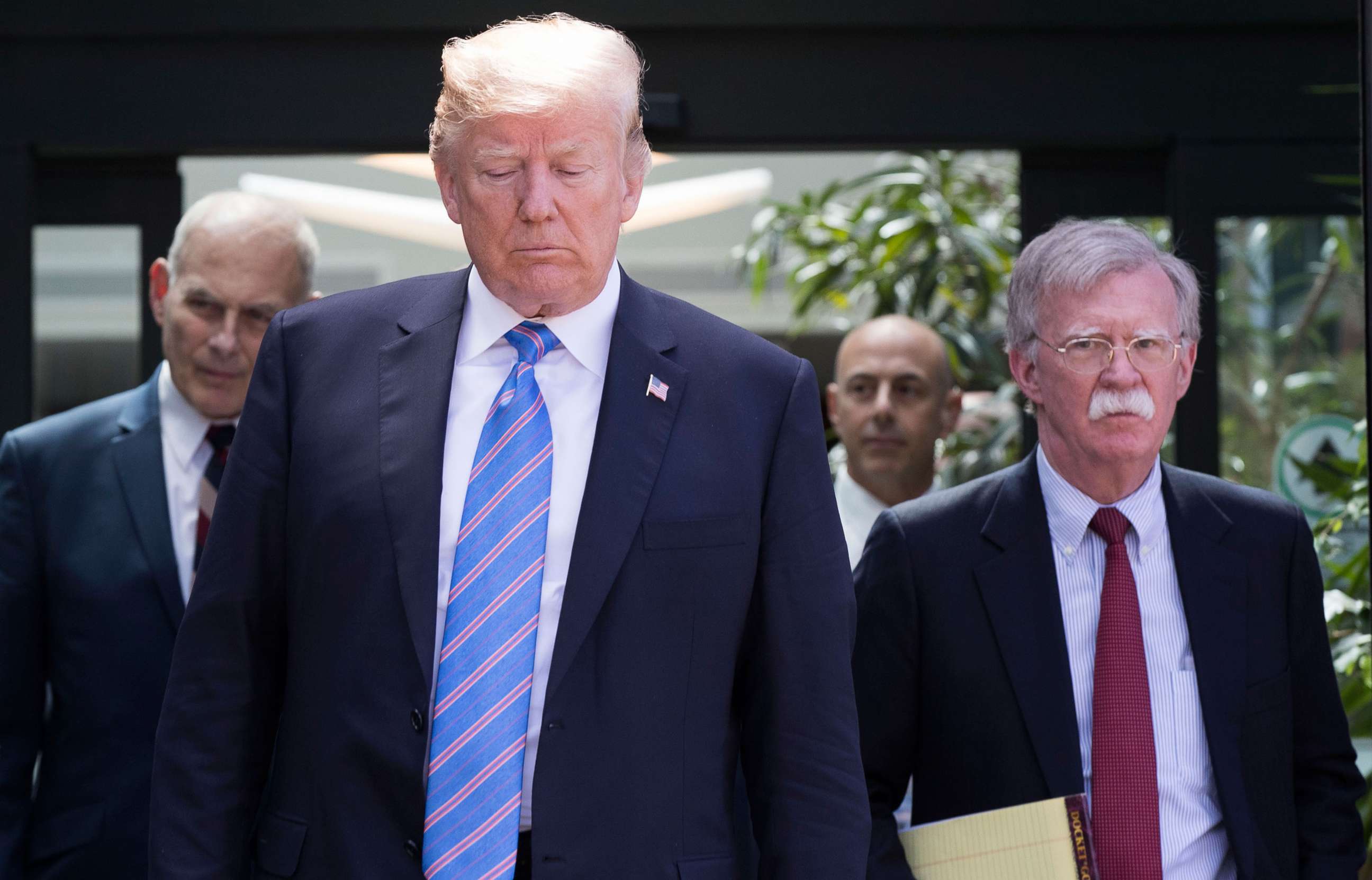White House sent warning letter to Bolton, possible impeachment witness, that book contains classified information
The letter, sent electronically on Jan. 23, was addressed to Bolton's attorney.
The White House on Wednesday released a letter it sent to former national security adviser John Bolton's attorney earlier this month warning that his book manuscript "appears to contain significant amounts of classified information" and that some of the information is classified as "TOP SECRET."
The letter's release comes as senators face the question of whether to call Bolton as a witness in President Donald Trump's impeachment trial to testify about allegations he reportedly makes in the book relating directly to the charges against the president.
Without the removal of the information the White House deemed classified in its review, the letter says, "the manuscript may not be published."
The letter, sent electronically on Jan. 23, was addressed to Bolton's attorney Charles Cooper and signed by the National Security Council's Senior Director for Records, Access and Information Security Management Ellen Knight.

The letter was sent three days before the New York Times published its report based on Bolton's unpublished manuscript that reportedly contains an allegation that the president had tied the frozen Ukraine funding to desired investigations into Democrats.
Bolton's attorney, Charles Cooper, has since released his email response to the White House's letter. In the email, Cooper raises with Knight that Bolton could be called to testify in the Senate impeachment trial and requests clarity on whether the White House is asserting that the portion of the manuscript that relates to Ukraine is classified.
"We do not believe that any of that information could reasonably be considered classified, but given that Ambassador Bolton could be called to testify as early as next week, it is imperative that we have the results of your review of that chapter as soon as possible."
Cooper said he has yet to receive a response to his follow-up email and that the last correspondence he has received from the White House was the Jan. 23 letter.
The revelation of Bolton's accusation and its relevance to a key question in the ongoing impeachment trial against Trump increased pressure on a key group of moderate Republicans who have not ruled out the possibility of supporting Democrats' quest to call witnesses in the trial.
Trump, who had praised his former national security adviser in the months since his exit from the administration, has since taken to attacking Bolton and accusing him of lying since the revelations from Bolton's manuscript have spilled into the public.
On Twitter Wednesday, the president sought to belittle the man he formerly had tasked with leading his national security strategy as a "guy who couldn't get approved for the Ambassador to the U.N. years ago and now has written a "nasty & untrue book" based on "All Classified National Security."
Last week, the president said it would be a "national security problem" to have Bolton testify in the Senate impeachment trial.
"John, he knows some of my thoughts. He knows what I think about leaders. What happens if he reveals what I think about a certain leader, and it's not very positive, and then I have to deal on behalf of the country? It's going to be very hard," Trump told reporters last week during a press conference in Davos, Switzerland.
Beyond the potential of Bolton testimony, the newly revealed letter shows that the White House could, at a minimum, hold up the process of Bolton publishing his book by putting him in a holding pattern as they adjudicate portions that the White House says contain classified information.
It could also deter Bolton from speaking out publicly about his allegations, ABC News contributor and former acting Department of Homeland Security Undersecretary John Cohen said.
There’s also the possibility that the White House could seek to prosecute Bolton if he did move forward with publishing the manuscript as-is or speak out in some other public forum, Cohen added.
One prosecution possibility, Cohen said, would be to accuse him of a security violation, which could result in Bolton losing his security clearance and prevent him from obtaining a clearance in the future.
The former national security adviser could also be prosecuted criminally and face the prospect of a fine or even jail time, if he is shown to have "intentionally and knowingly disclosed information he knew to be classified."
Bolton's team has publicly and forcefully denied leaking the manuscript of his book to the New York Times.
It's unlikely -- based on precedent -- that the government would seek to prosecute Bolton prior to publishing the manuscript. Mark Zaid, an attorney who regularly deals with classifications and clearing books, told ABC News that he has never seen the government prosecute anyone for having classified material in a book manuscript so long as that material is not published. However, Zaid said he advises his clients to be cautious because the Trump administration has broken with other norms before.
While the issue of classification and declassification is an issue over which the president has ultimate authority, Cohen said the Trump White House is suffering from a "credibility problem" in its handling of classified information. Cohen points to the July 25 call memorandum that was put on a highly classified server, even though the contents of the call with Ukrainian President Volodymyr Zelenskiy didn’t meet the standard of classification to justify its placement on that server.
Tim Morrison, the former senior director for Europe and Russia at the National Security Council, testified that he was told the memorandum had been placed on that server by "mistake."
"Generally the rule has always been that the classification process is to protect against the disclosure of information that, if public, could harm the national security of the U.S.," he said. "It has been considered inappropriate to use the classification process for political purposes or to hide embarrassing information or criminality."
ABC News' Martha Raddatz contributed reporting.




